Published on:
6 min read
Emergency Dentists: Quick Solutions for Dental Disasters
Dental emergencies can happen at any time, leaving you in pain and uncertainty. Knowing where to turn for urgent care can make all the difference. This guide explores the role of emergency dentists in providing immediate solutions to common dental issues.

Understanding Dental Emergencies
Dental emergencies can range from severe toothaches to fractured teeth. Understanding what constitutes a dental emergency is crucial for seeking timely care. Common scenarios include knocked-out teeth, abscesses, or unexpected oral injuries. These situations not only cause significant pain but can also lead to long-term complications if not addressed promptly. Recognizing the symptoms and understanding when to call an emergency dentist can save your smile and alleviate suffering. In addition, routine checks and preventive care can help minimize the risk of such emergencies, allowing for better overall dental health.
When to Seek Emergency Dental Care
It's essential to know when to contact an emergency dentist, as not all dental problems require immediate attention. Indicators for urgent care include severe pain, uncontrolled bleeding, swelling, or difficulty swallowing or breathing. A knocked-out tooth is particularly time-sensitive; immediate action can increase the chances of saving the tooth. Other scenarios, like a cracked tooth or abscessed gums, also require prompt evaluation. Keeping an emergency dentist's contact information handy can make a critical difference when these situations arise, allowing you to get the help you need without delay.
Preparing for a Dental Emergency
Preparation is key to managing dental emergencies effectively. It’s beneficial to have an emergency kit that contains essential items such as dental wax, a toothbrush, and temporary filling material. Additionally, compiling important dental information like past treatments or allergies can expedite care during an emergency. Knowing the location of the nearest emergency dental clinic and their hours can save valuable time. Regular dental check-ups can also help anticipate potential issues before they escalate into emergencies, allowing you to take proactive steps and maintain good oral health.
Conclusion: Be Proactive About Dental Care
In conclusion, dental emergencies can strike unexpectedly, and being prepared can significantly ease the burden. By understanding what necessitates urgent care, taking preventive measures, and securing emergency contacts, you can navigate these situations more effectively. Regular dental visits contribute to a healthier mouth and enable proactive solutions, ensuring that when an emergency does occur, you are ready to respond promptly.
Published on .
Share now!










